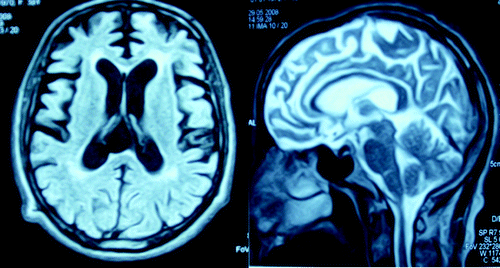Neurosyphilis as a Cause of Cognitive Decline and Psychiatric Symptoms at Younger Age
Case Report
A 38-year-old man was admitted to the hospital with a 3-year history of memory impairment. He had attended the psychiatric clinic with manic behavior, aggression, and delusions, and had been treated with antipsychotics and antidepressants. One year earlier, he had had speech difficulty, sometimes using words in other languages. Six months later, he developed pallilalia and episodes of laughing and crying. He reported no previous disease, and the family history was unremarkable. The physical examination showed no abnormality. On neurological examination, he was alert, disoriented, and had slight dysarthria; he was slow in response to commands. Pupils did not respond to light but contracted normally to accommodation and convergence (Argyll-Robertson pupils). The deep tendon reflexes were symmetric and brisk. The plantar responses were bilaterally extensor. Results of liver function tests, thyroid hormones, vitamin B12, folic acid, and other biochemical tests were normal. In serum testing, treponema pallidum hemagglutination assay (TPHA) and venereal disease research laboratory test (VDRL) were positive, at 1/5120 and 1/8 titers, respectively. CSF showed normal WBC count, protein 25 mg/dl, glucose 56 mg/dl, and the TPHA test was positive, at 1/320 titer. He was serologically negative for HIV infection. His Mini-Mental State Exam (MMSE) score was 8/30 because of to deficits in orientation, memory, attention, calculation, recall, and language. Cranial MRI study showed cerebral atrophy, particularly in the frontal lobe Figure 1).

The patient was started on ceftriaxone (1.2g IM daily) for 14 days. He is currently being monitored by neurology and infectious disease departments, and syphilis serology will be performed regularly during that time.
Discussion
“General paresis” or dementia paralytica is a rapidly-progressive dementia characterized by personality changes and memory deficits. It usually develops 10 to 25 years after syphilis infection, but it can occur as soon as 2 years after the infection. In the early course of the illness, most of the patients had deficits in memory and judgment, leading to severe dementia. On the other hand, individuals may have severe psychiatric symptoms like psychosis, depression, or mania.2,3 Higher doses of intravenous Penicillin G have been recommended as first-line therapy for neurosyphilis over the years, and neurological examination and lumbar puncture should be performed at 3 to 6 months after the penicillin treatment.4,5
As for our patient, dementia and cognitive decline persisted after antisyphilis treatment, and activities of daily livings were supported with help. We want to emphasize the necessity of early treatment in syphilis cases.
1. : Update on neurosyphilis. Curr Infect Dis Rep 2009; 11:127–134Crossref, Medline, Google Scholar
2. : Unusual case report: three cases of psychiatric manifestations of neurosyphilis. Psychiatr Serv 2004; 55:830–832Crossref, Medline, Google Scholar
3. : Neurosyphilis presenting as schizophrenia-like psychosis. Neuropsychiatry Neuropsychol Behav Neurol 2000; 13:297–302Medline, Google Scholar
4. : Sexually-Transmitted Disease Treatment Guidelines, 2006. MMWR Recomm Rep 2006; 55:1Medline, Google Scholar
5. : Cerebrospinal fluid abnormalities in patients with syphilis: association with clinical and laboratory features. J Infect Dis 2004; 189:369Crossref, Medline, Google Scholar



